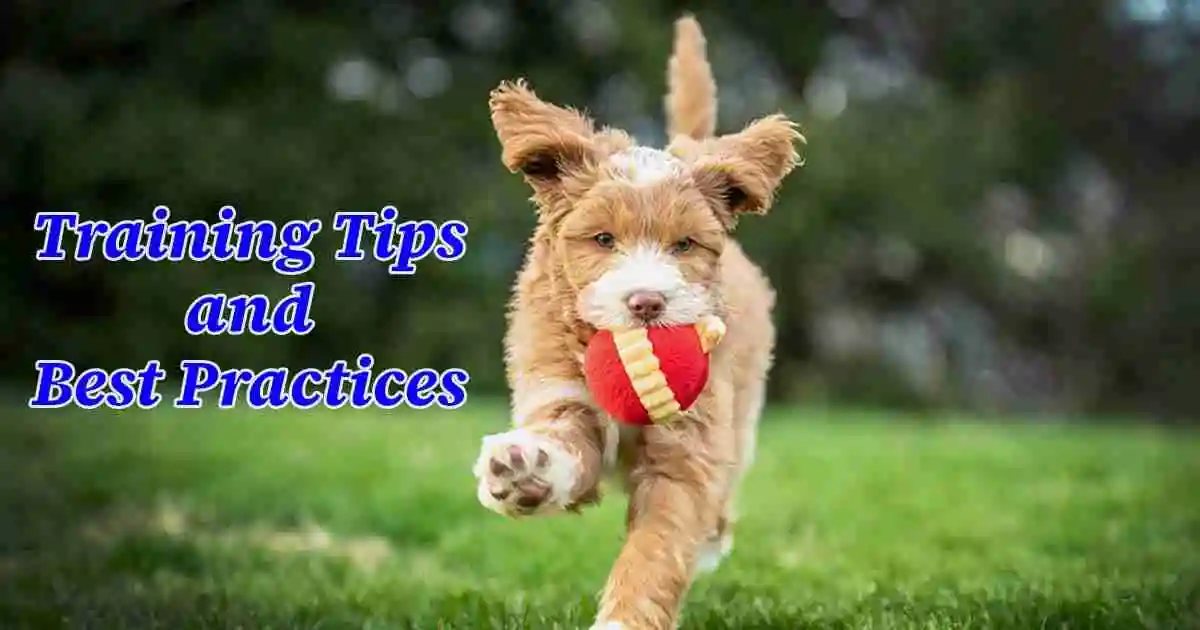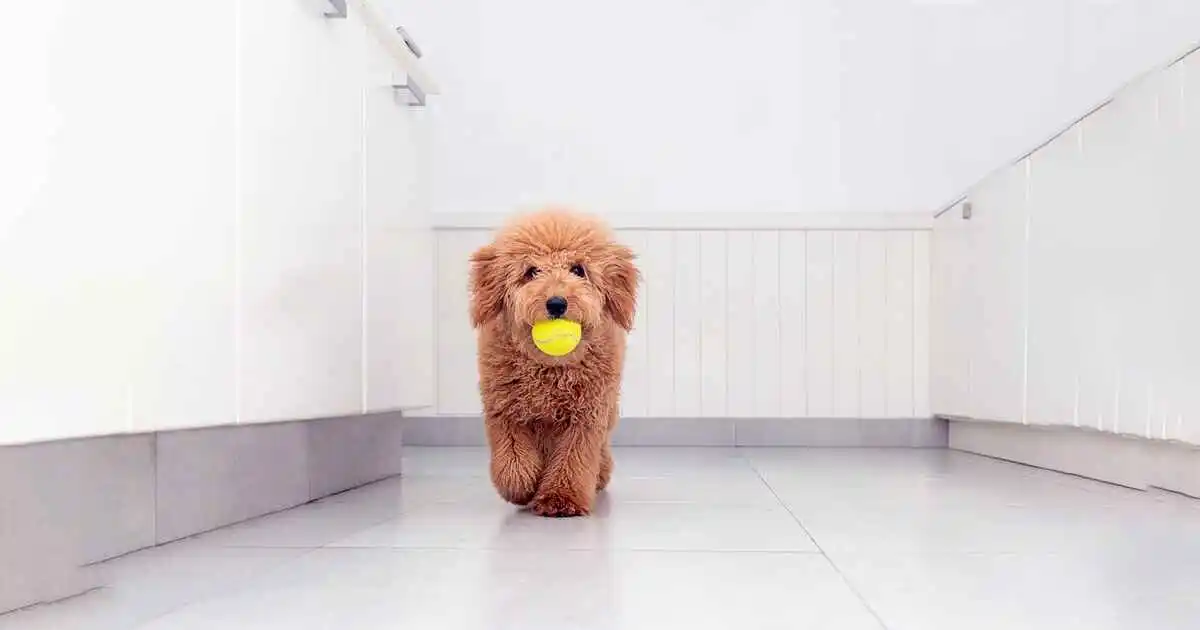Mini Goldendoodles are a popular crossbreed between a Golden Retriever and a Miniature Poodle. Known for their intelligence, affectionate nature, and low-shedding coat, they make excellent family pets and companions.
However, like any dog breed, they require proper training to become well-behaved and well-adjusted adult dogs. In this article, we will explore the ins and outs of Mini Goldendoodle training, covering topics from basic obedience to advanced behaviour modification.
Table of Contents
ToggleMini Goldendoodle training requires patience, consistency, and positive reinforcement. By understanding their temperament and needs, establishing clear communication and boundaries, and addressing common challenges and behavioural issues, you can raise a well-behaved and well-adjusted adult dog.
Understanding Mini Goldendoodle Temperament and Needs
Understanding Mini Goldendoodle temperament and needs is essential for providing optimal care and companionship to these beloved canine companions. Mini Goldendoodles, a crossbreed between a Golden Retriever and a Miniature Poodle, typically inherit the best traits from both parent breeds.
Known for their affectionate nature, intelligence, and playful demeanor, Mini Goldendoodles thrive in environments where they receive ample love, attention, and mental stimulation. Their social nature makes them excellent family pets, often forming strong bonds with children and adults alike.
Regular exercise is crucial to keep them mentally and physically healthy, as they possess high energy levels and enjoy activities such as walks, hikes, and interactive play.
Additionally, consistent training and positive reinforcement help channel their intelligence and eagerness to please into well-behaved manners. Providing a balanced diet, routine veterinary care, and grooming maintenance are also vital aspects of caring for a Mini Goldendoodle, ensuring a happy and fulfilling life for these delightful companions.
This breed is known for their:
- High intelligence and trainability
- Friendly and social nature
- Energetic and playful personalities
- Need for regular exercise and mental stimulation
- Tendency to be sensitive and emotional
Mini Goldendoodles are also prone to certain behavioral issues, such as separation anxiety, barking, and chewing. Due to their strong attachment to their human family members, they may experience distress when left alone for extended periods. Separation anxiety can manifest in behaviors like incessant barking, destructive chewing, and attempts to escape.
Understanding these needs and tendencies will help you develop an effective training plan tailored to address these issues. Incorporating techniques like gradual desensitization to alone time, providing engaging toys or puzzles to keep them mentally stimulated, and establishing a consistent routine can help alleviate separation anxiety.
Additionally, positive reinforcement training methods can curb excessive barking and redirect chewing behaviors towards appropriate outlets, such as durable chew toys. With patience, consistency, and understanding of their unique temperament, Mini Goldendoodles can thrive as well-adjusted and happy members of the family.
Basic Obedience Mini Goldendoodle Training
Basic obedience training is the foundation of any successful dog training program, particularly for Mini Goldendoodles. These intelligent and eager-to-please dogs thrive on mental stimulation and structured activities. Beginning with basic commands such as sit, stay, come, and heel lays the groundwork for clear communication between you and your Mini Goldendoodle.
Positive reinforcement techniques, such as treats, praise, and play, are highly effective in teaching these commands and reinforcing desired behaviour’s. Consistency is key during training sessions, which should be kept short and frequent to maintain engagement and prevent boredom.
Given their sociable nature, Mini Goldendoodles also benefit from socialization training from an early age. Exposing them to various environments, people, and other animals helps prevent shyness or fearfulness later in life. Puppy kindergarten classes or supervised playdates provide valuable opportunities for social interaction and learning appropriate social cues.
- Teaching basic commands like “sit,” “stay,” “come,” and “leave it”
- Establishing clear communication and boundaries
- Socializing with people, other animals, and new environments

In addition to obedience and socialization, leash training is essential for Mini Goldendoodles. Teaching them to walk calmly on a leash prevents pulling and promotes enjoyable walks for both you and your furry friend. Utilizing positive reinforcement and patience, gradually introduce the leash and encourage loose leash walking behavior through consistent practice.
Furthermore, incorporating mental enrichment activities, such as puzzle toys, scent games, and obedience challenges, keeps their minds sharp and satisfies their natural curiosity. These activities not only provide mental stimulation but also strengthen the bond between you and your Mini Goldendoodle.
Overall, basic obedience training is a fundamental aspect of caring for a Mini Goldendoodle, laying the groundwork for a well-behaved, confident, and happy companion. Through positive reinforcement, consistency, and patience, you can nurture their innate intelligence and ensure a fulfilling relationship built on trust and mutual understanding.
Basic obedience training should start early, ideally from 8 weeks old. Use positive reinforcement techniques like treats, praise, and affection to encourage good behaviour. Be consistent and patient, as Mini Goldendoodles can be sensitive and emotional.
Housebreaking and Potty Training
Housebreaking and potty training are crucial aspects of Mini Goldendoodle training, ensuring a harmonious living environment for both you and your furry companion. Establishing a consistent routine and schedule is key to successful housebreaking. Take your Mini Goldendoodle outside to their designated potty area first thing in the morning, after meals, after naps, and before bedtime.
Using positive reinforcement techniques, such as treats and praise, when they eliminate in the appropriate spot helps reinforce desired behavior and accelerates the training process. It’s essential to watch for signs that your Mini Goldendoodle needs to eliminate, such as sniffing, circling, or restlessness.
By paying attention to these cues, you can anticipate when they need to go outside and prevent accidents indoors. However, accidents are inevitable during the housebreaking process, so patience and consistency are paramount. Avoid punishment for accidents and instead focus on reinforcing good behavior to encourage learning.
- Establish a consistent routine and schedule
- Use positive reinforcement techniques like treats and praise
- Watch for signs like sniffing and circling
- Be patient and consistent, as accidents will happen
For added convenience, consider using potty pads or creating a designated potty area in your home, especially during the initial stages of training or in situations where outdoor access is limited. Gradually transition from indoor to outdoor potty training as your Mini Goldendoodle becomes more accustomed to the routine.
Keep in mind that housebreaking and potty training may take time and dedication, so be prepared to invest both. Consistency, patience, and positive reinforcement are the cornerstones of successful training, ultimately leading to a well-behaved and reliably house-trained Mini Goldendoodle. Housebreaking and potty training may take time, so be prepared to invest time and effort. Use potty pads or a designated potty area to make cleanup easier.
Advanced Training and behaviour Modification
Once your Mini Goldendoodle has mastered basic obedience, it’s time to move on to advanced training and behaviour modification. This includes:
- Teaching complex commands like “stay close” and “heel”
- Addressing behavioural issues like barking, chewing, and separation anxiety
- Using positive reinforcement techniques like clicker training
- Gradually increasing distractions and challenges
Advanced training and behaviour modification require patience, consistency, and creativity. Use positive reinforcement techniques and avoid punishment or negative reinforcement.
Training Tips and Best Practices
Here are some additional training tips and best practices to keep in mind:

Start Early: Begin training your Mini Goldendoodle as soon as you bring them home. Early socialization and training are crucial for their development.
Positive Reinforcement: Use positive reinforcement techniques such as treats, praise, and toys to encourage good behavior. Mini Goldendoodles respond well to rewards and praise.
Consistency: Be consistent with your commands and expectations. Use the same cues and gestures each time you want them to perform a certain behavior.
Patience: Training takes time and patience, especially with a puppy. Stay patient and understanding, and don’t get frustrated if progress is slow.
Basic Commands: Teach your Mini Goldendoodle basic commands such as sit, stay, come, and down. These commands are essential for their safety and your control.
Socialization: Expose your Mini Goldendoodle to different people, animals, and environments from a young age to help them become well-adjusted and confident.
Exercise: Provide plenty of physical and mental exercise for your Mini Goldendoodle to prevent boredom and destructive behavior. Interactive toys, walks, and playtime are all important.
Training Sessions: Keep training sessions short and fun to maintain your Mini Goldendoodle’s interest and attention span. Aim for multiple short sessions throughout the day rather than one long session.
Be Firm but Gentle: Set clear boundaries and rules for your Mini Goldendoodle, but always use a gentle and positive approach in training. Avoid harsh punishment, as it can damage trust and hinder progress.
Be the Leader: Establish yourself as the pack leader by being confident, calm, and consistent in your interactions with your Mini Goldendoodle. They will respond better to leadership and guidance.
Training for Specific behaviours
Mini Goldendoodles can be trained for specific behaviours, such as:
- Agility training: Teach them to navigate obstacles and courses
- Obedience training: Teach them to respond to commands and behave well in public
- Therapy training: Teach them to provide comfort and support as therapy dogs
- Service training: Teach them to assist with disabilities and tasks
Advanced Training Techniques
Here are some advanced training techniques to help you get the most out of your Mini Goldendoodle:
- Clicker training: Use a clicker to mark good behaviour and reward with treats
- Shaping: Teach complex behaviours by breaking them down into smaller steps
- Chaining: Teach a series of behaviours in a specific order
- Desensitisation: Help your dog overcome fears and phobias
Troubleshooting Common Issues
As you embark on training your Mini Goldendoodle, you may encounter common behavioral issues that require attention and proactive management. Here are some prevalent challenges and effective strategies to address them:
Barking and whining:
Mini Goldendoodles are known for their vocal nature, and excessive barking or whining can sometimes become problematic. To tackle this issue, it’s essential to understand the root cause. Often, barking and whining stem from boredom, attention-seeking behaviour, or anxiety.
Ignoring the undesired behaviour and rewarding moments of quiet can help reinforce the desired calmness. Additionally, addressing underlying factors such as insufficient exercise or mental stimulation can alleviate boredom and reduce excessive vocalization.
Chewing and destruction:
Chewing is a natural behaviour for canines, particularly during puppyhood when getting teeth or investigating their current circumstance. However, destructive chewing can become problematic if not addressed appropriately. Providing plenty of chew toys designed for puppies, such as durable rubber or nylon toys, can redirect their chewing behaviour onto acceptable outlets.
Supervising your Mini Goldendoodle and promptly redirecting them to their toys when they attempt to chew on inappropriate items reinforces the desired behaviour. Addressing underlying issues such as boredom or anxiety through increased exercise and mental stimulation can also help mitigate destructive chewing tendencies.
Separation anxiety:
Mini Goldendoodles are known for their strong bonds with their human companions, which can sometimes lead to separation anxiety when left alone. To help your Mini Goldendoodle cope with separation anxiety, gradually acclimate them to alone time by starting with short periods and gradually increasing duration. Providing plenty of physical exercise, such as walks or playtime, can help expend excess energy and promote relaxation when alone.
Additionally, engaging your Mini Goldendoodle in mentally stimulating activities, such as puzzle toys or training sessions, can help alleviate anxiety and boredom. Consider using calming aids like pheromone diffusers or calming music to create a soothing environment in your absence.
By addressing these common issues with patience, consistency, and understanding, you can effectively navigate the training process and foster a harmonious relationship with your Mini Goldendoodle. Remember that every dog is unique, so tailor your approach to suit your dog’s individual needs and temperament.
Additional Resources
Here are some additional resources to help you with Mini Goldendoodle training:
- – Professional dog trainers and behaviourists
- – Online training resources and tutorials
- – Dog training classes and workshops
- – Breed-specific training groups and forums
- – Books and DVDs on dog training and behaviour
Training for Specific Activities
Mini Goldendoodles can be trained for specific activities, such as:
- – Hiking and outdoor adventures
- – Agility and obstacle courses
- – Swimming and water activities
- – Therapy work and visiting nursing homes
- – Service work and assisting with disabilities
Final Tips and Reminders
Here are some final tips and reminders to keep in mind when training your Mini Goldendoodle:
- – Be patient and consistent
- – Use positive reinforcement techniques
- – Keep training sessions short and fun
- – Involve all family members in training
- – Be prepared to adapt your training approach as your dog grows and matures
- – Seek professional help if needed
Training for Different Life Stages
Mini Goldendoodles go through different life stages, and training should be adapted accordingly:
| Life Stage | Age | Training Focus |
| Puppyhood | 0-1 year | Basic obedience: Teach basic commands such as sit, stay, come, and leash manners.
Socialization: Expose the puppy to various environments, people, and animals to build confidence and prevent fear-based behaviours. Housebreaking: Establish a consistent routine for bathroom breaks and teach appropriate elimination areas. |
| Adolescence | 1-2 years | Continue basic obedience: Reinforce previously learned commands and introduce more advanced commands like heel and leave it.
Introduce advanced training: Begin training for specific activities such as agility, obedience competitions, or therapy work. Address behavioural issues: Address any emerging behavioural problems such as jumping, chewing, or excessive barking. |
| Adulthood | 2-5 years | Refine training: Fine-tune obedience commands and continue practising advanced training activities.
Focus on specific activities: Engage in activities that align with the dog’s interests and abilities, such as hiking, fetch, or scent work. Maintain socialization: Continue exposing the dog to new people, animals, and environments to prevent socialization regression. |
| Seniorhood | 5+ years | Adapt training to physical limitations: Modify exercises and activities to accommodate any physical limitations or age-related conditions.
Focus on mental stimulation: Incorporate brain games, puzzle toys, and training exercises that challenge the dog mentally to keep their mind sharp. Maintain socialization: Continue socializing the dog with familiar and new people and animals, albeit at a pace that suits their energy levels and health status. |
Common Challenges and Solutions
Every dog breed comes with its unique challenges, and Mini Goldendoodles are no exception. Here are some common challenges and solutions to keep in mind:
Separation anxiety:
Gradually increase alone time, provide plenty of exercise and mental stimulation, and use calming aids like pheromone diffusers
Barking and whining:
Ignore the behaviour, reward quiet behaviour, and address underlying issues like boredom or anxiety
Chewing and destruction:
Provide plenty of chew toys and exercise, supervise and redirect behaviour, and address underlying issues like teething or boredom
Socialization and Environmental Enrichment
Socialization and environmental enrichment are crucial for Mini Goldendoodles. Here are some tips to get you started:
- – Socialize with people, other animals, and new environments
- – Provide plenty of toys and chews to keep them occupied
- – Rotate toys and environments regularly to prevent boredom
- – Provide regular exercise and mental stimulation
Nutrition and Health
Proper nutrition and health are essential for Mini Goldendoodles. Here are some tips to keep in mind:
- – Feed a high-quality dog food that meets their nutritional needs
- – Provide regular exercise and mental stimulation to prevent obesity and boredom
- – Monitor their health and address any issues promptly
- – Provide regular veterinary check-ups and vaccinations
Grooming and Hygiene
Require regular Mini Goldendoodles grooming and hygiene to prevent matting, tangling, and skin issues. Here are some tips to keep in mind:
- – Brush their coat regularly to prevent matting and tangling
- – Bathe them every 4-6 weeks, or as needed
- – Trim their coat every 6-8 weeks to prevent overgrowth
- – Clean their ears and eyes regularly to prevent infections
- – Brush their teeth regularly to prevent tartar buildup and promote good oral health
Conclusion
Mini Goldendoodle training requires patience, consistency, and positive reinforcement. By understanding their temperament and needs, establishing clear communication and boundaries, and addressing common challenges and behavioural issues, you can raise a well-behaved and well-adjusted adult dog.
Remember to be flexible and adapt your training approach as your Mini Goldendoodle grows and matures. Each life stage presents unique challenges and opportunities for growth, and being responsive to your dog’s changing needs will help you build a strong and lasting bond.
Don’t hesitate to seek professional help if needed. Whether you’re dealing with a specific behavioural issue or simply want guidance on the best training practices for your Mini Goldendoodle, a qualified trainer or behaviourist can provide valuable expertise and support. With time, effort, and the right approach, you can help your Mini Goldendoodle become a happy, healthy, and well-trained companion.



